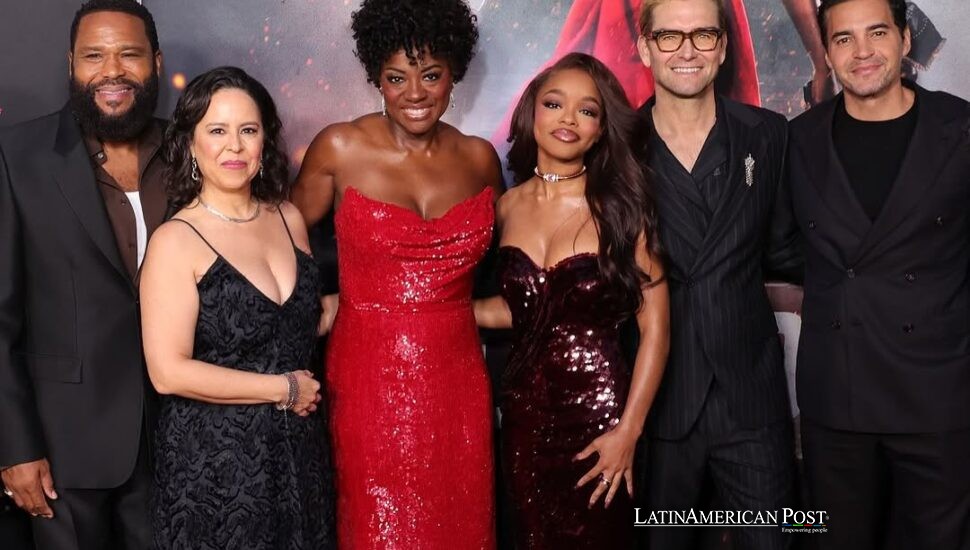Mexico’s Patricia Riggen Shakes Hollywood With Bold ‘G20’

Poised to captivate audiences worldwide, director Patricia Riggen brings a fresh twist to Hollywood action cinema. Her latest film, “G20,” stars Viola Davis as America’s first Black female president—an audacious leap that fuses political drama, cultural diversity, and riveting suspense.
A Pioneering Path in Action Cinema
Patricia Riggen, born in Guadalajara, has become one of the few Mexican women to carve out a career in Hollywood’s competitive landscape. Her journey reaches a new milestone with “G20,” an action film set to debut on Prime Video on April 10. In a genre historically dominated by male directors, Riggen recognizes the rarity of her achievement. “I know I’m a pioneer,” she told EFE in an interview in London. “First, because there are still not many women who get access to direct action movies. And if you add the fact that I’m Mexican, it’s even tougher. People hesitate to hand over such important and high-risk projects—these are big-budget films.”
Despite those hurdles, Riggen feels that “G20” represents a breakthrough. “I’m very fortunate to have had this opportunity and for the film to be doing so well,” she told EFE. Her confidence stems partly from the film’s unique premise. Viola Davis stars as Danielle Sutton, the U.S. president attending a G20 summit in South Africa when terrorists seize control. The attackers aim to enrich themselves through cryptocurrency, but Sutton’s military background proves decisive in orchestrating a high-stakes rescue. The tension escalates further when she must also protect her children, whom she brings along in an attempt at balancing motherhood with her responsibilities as leader of the free world.
Riggen’s filmmaking career spans diverse genres. She directed “La Misma Luna” (2007), a poignant drama about immigration, and episodes of the series “Jack Ryan” (2018), which introduced her to high-tension storylines. Still, an action blockbuster like “G20” demanded a different level of preparation. She rewrote portions of the screenplay—“the concept was there, but the plot wasn’t working”—and engaged a former CIA operative and a summit security expert to enhance authenticity. “It’s a big risk for studios,” she explained, “because these movies require enormous budgets. But I wanted to prove that a woman—especially a Mexican woman—could bring a fresh perspective.”
Cultural Shifts and Creative Vision
At its core, “G20” merges action-driven entertainment with Riggen’s ambition to spark social change. “I didn’t just want a fun movie,” she said to EFE. “I also wanted to contribute a little bit to cultural change.” Seeing Viola Davis cast as a female U.S. president—particularly a Black woman—transforms the film into more than just a rollercoaster of stunts and explosions. “All of a sudden, it becomes an important movie. Unconsciously, we’re contributing to normalizing the idea of having a woman in the Oval Office,” she said.
Because there were no real-life Black female presidents to model the character after, Riggen found herself in uncharted territory. “When I was designing the look of the film, I didn’t even have reference photos,” she confessed. “There aren’t any action films led by a Black female protagonist, either.” The challenge, then, was to craft a nuanced, multidimensional role for Davis—one that combined credible leadership, physical prowess, and emotional depth. “It’s important for me, when I see a woman fighting in an action film, that it be believable,” Riggen said. Early scenes show Sutton practicing jiu-jitsu with a bodyguard, establishing her as someone who belongs to a military and defense background.
Riggen also devoted considerable effort to building out each character’s backstory, believing that truly engaging action movies rely on more than car chases and shootouts. “There are tons of action films, and most are not super interesting,” she remarked. “I don’t like the genre for its own sake. You need a story that captivates you, characters you care about, emotional stakes that pull you in.” In “G20,” Sutton’s mother-daughter relationship becomes a key emotional anchor—a testament to Riggen’s insistence that high-octane plots and heartfelt drama need not be mutually exclusive.
Her reworking of the screenplay went far beyond surface-level changes. “I hired experts to bring realism,” she recalled, “but also to give the story heart. I wanted each actor to have an inner life that resonates with viewers.” This approach makes the stakes personal rather than merely political, an angle Riggen believes will help “G20” stand out from other action thrillers that often skate by on spectacle alone.
A Global Lens for a Global Tale
“G20” revolves around a summit of the world’s major economies—an inherently international storyline that Riggen wanted to reflect in both casting and tone. “We brought in people from many different nationalities to shape the narrative,” she told EFE. “It was important not to rely solely on an American point of view, especially since the plot deals with an event as multilateral as the G20.” She noted that the film’s diverse ensemble has allowed them to offer critiques of American attitudes within the story, as well as to highlight perspectives from other parts of the world.
For Riggen, the movie’s global backdrop is not just window dressing but a reflection of an interconnected reality. “If you’re going to talk about the G20, you can’t just say, ‘It’s the U.S. and then everyone else is in the background,’” she argued. “It’s a stage where many voices need to be heard.” The complexity of those voices adds another layer to the plot, from the motivations of international delegates to the cultural nuances that shape negotiations under duress.
As the clock ticks down to the film’s global premiere, Riggen remains hopeful “G20” will resonate with audiences far beyond the usual action crowd. With Viola Davis anchoring the lead role, the production fuses gritty suspense with cultural commentary, exploring what leadership, diversity, and maternal responsibility might look like in extreme circumstances. Riggen’s own journey mirrors the film’s message of breaking barriers: “I want people to see that women—especially Latinas—are capable of delivering large-scale, complex stories,” she said. “It’s a chance to prove ourselves in a world that’s historically been closed to us.”
Though the stakes in the film are life and death, the underlying stakes for Hollywood are equally significant. “G20” hints at a future where action heroes are not confined to one gender, ethnicity, or background. By directing a big-budget thriller featuring a Black female U.S. president, Riggen is throwing open a door she once found locked. “I’m just happy to help move that needle,” she reflected. “If our movie can encourage even a small shift in perception, then we’ve done something worthwhile.”
Also Read: Afro-Inspired Cultural Journeys in Latin America Showcase Traditions and Captivating Stories
Ultimately, Riggen’s perspective is shaped by the same determination that led her from Guadalajara to Hollywood. “We can’t just wait for someone to invite us,” she concluded. “You have to prove you can do the job. And once you do, it paves the way for others.” With “G20” set to reach audiences worldwide, that path may become a little wider—reminding viewers that what once seemed impossible can, with courage and skill, become the new cinematic normal.





